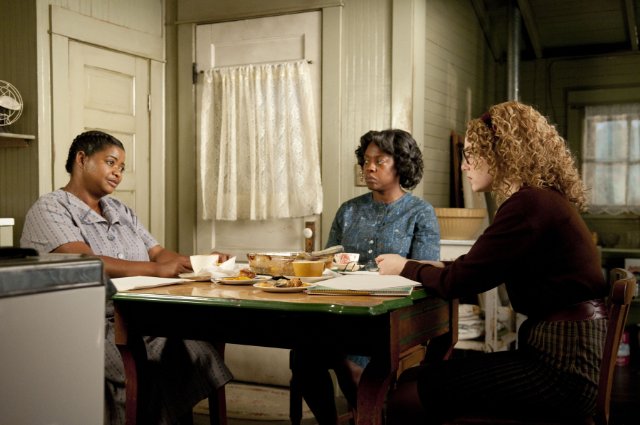2011. Rated PG-13, 146 minutes.
Cast:
Emma Stone
Viola Davis
Bryce Dallas Howard
Octavia Spencer
Sissy Spacek
Jessica Chastain
Ahna O’Reilly
Allison Janney
Anna Camp
Cicely Tyson
Chris Lowell
Cast:
Emma Stone
Viola Davis
Bryce Dallas Howard
Octavia Spencer
Sissy Spacek
Jessica Chastain
Ahna O’Reilly
Allison Janney
Anna Camp
Cicely Tyson
Chris Lowell
Skeeter (Stone) has returned home from college and aspires to be a serious writer. Home is Jackson, Mississippi and this is the 1960s. It is common for the affluent white families to have black maids who not only cook and clean but practically raise their children. Constantine (Tyson), the maid who raised Skeeter no longer works for the family, much to Skeeter’s dismay.
Also not to Skeeter’s liking is the way the town’s maids are treated in general. They are often mistreated and demeaned. Since this appears to be the only type of employment available to black women, they perform their duties and bite their tongues. Skeeter decides she wants to write a book telling the perspective of these women. As you might imagine, this is no easy task.
The chief characters on each side of the racial line assume the roles of hero and villain. For the maids Aibileen (Davis) becomes one of the heroes. She’s the first one to agree to talk to Skeeter. Given the climate of the times, she’s literally putting her life on the line. Our villain is Hilly (Howard). Hilly rules Jackson’s group of wealthy white housewives with an iron fist. She’s the one the others aspire to please and fear incurring her wrath.
I guess here is where I should mention that men are only on the periphery of this world. White men appear occasionally. Mostly, they’re off to work ruling the parts of Jackson outside of their own households. Black men are almost non-existent except for distant civil rights leaders (distant meaning only seen on television) and Minny’s (Spencer) abusive husband Leroy. Even he is only heard and never seen. If this movie has flaws they come from this setup. White men have nothing of consequence to say, showing no backbone despite either being responsible for or at least presumably supportive of society’s design. Black men are either far away martyrs or, as represented by our most tangible vessel, angry wife-beaters totally dependent on their women to support the family.
Luckily, this world full of women is deeply engrossing. There are demons to exorcise and obstacles to overcome on all sides. Not only is Skeeter having a difficult time putting together her book, but her mother is withering away due to cancer. That’s not to mention all the issues others have. However, they all come together in a manner that enhances the ending without overwhelming the movie.
It also helps that there are a bevy of wonderful performances. Fresh off her outstanding work in Easy A, Emma Stone is again very good. However, she’s outdone by the cast around her. As Aibileen, Viola Davis is perfectly restrained, exuding the quiet strength it takes to do her job and then to speak about it to Skeeter. Octavia Spencer is much the opposite as Minny. She’s loud and short-tempered. She plays it perfectly, stealing nearly all of her scenes. Some may complain Minny is a stereotypical character but she’s a perfect complement to the reserved Aibileen. The other scene-stealer is Bryce Dallas Howard as Hilly. It’s a thankless role but she fully embraces it and runs with it. By the end she becomes one of 2011’s best villains.
Without question, the subject matter is touchy. Racism has not disappeared yet. This is a movie that will inspire strong feelings. As such, it’s a film that deserves to be seen. Even if you don’t like it, it gives us something to discuss and possibly learn from. It is flawed but poignant.




No comments:
Post a Comment